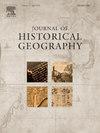(Post)colonial worlding in Jordan's nature reserves: Conservation, racial science, and national identity
IF 1.1
2区 历史学
Q2 GEOGRAPHY
引用次数: 0
Abstract
The 1960s saw a series of British expeditions to Jordan to establish protected areas. By carefully examining archival material pertaining to these expeditions, I demonstrate how these expeditions, and the protected areas they sought to establish, constituted crucial acts of (post)colonial worlding. These expeditions took place almost twenty years after the end of administrative colonialism in 1947 and reveal how conservation in Jordan remained entangled in colonial knowledge production and spatial control. I trace how conservation agendas in these expeditions were shaped by racial science, environmental orientalism, and geopolitical alliances, influencing both material practices and cultural framings of nature. When turning to the relationship between Jordanian elites and conservation, I demonstrate how (post)colonial identity struggles became central to conservation. A decolonial reading of the archive illuminates not only the dominance of colonial narratives but also the absence of Jordanian archival materials. Yet what is available, offers conservation framings rooted in geopolitics, mobility, and national identity. This paper advances two arguments. First, historical geographical approaches to (post)colonial worldmaking must engage more critically with conservation. Second, decolonial approaches to the archive demonstrate how conservation participates in worldmaking projects. Attending to archival presences and silences is key to forging more equitable conservation futures.
(后)约旦自然保护区的殖民世界:保护、种族科学和国家认同
20世纪60年代,英国人对约旦进行了一系列探险,以建立保护区。通过仔细检查与这些探险有关的档案材料,我展示了这些探险,以及他们试图建立的保护区,是如何构成(后)殖民世界的关键行为的。这些考察发生在1947年行政殖民主义结束近20年后,揭示了约旦的保护如何与殖民知识生产和空间控制纠缠在一起。我追溯了这些探险中的保护议程是如何受到种族科学、环境东方主义和地缘政治联盟的影响,影响了自然的物质实践和文化框架。当谈到约旦精英与保护之间的关系时,我展示了(后)殖民身份斗争如何成为保护的核心。对档案的非殖民化阅读不仅说明了殖民叙事的主导地位,而且还说明了约旦档案材料的缺失。然而,现有的保护框架是基于地缘政治、流动性和国家认同的。本文提出了两个论点。首先,(后)殖民世界形成的历史地理方法必须更严格地与保护联系起来。其次,非殖民化的档案方法展示了保护如何参与世界建设项目。关注档案的存在和沉默是打造更公平的保护未来的关键。
本文章由计算机程序翻译,如有差异,请以英文原文为准。
求助全文
约1分钟内获得全文
求助全文
来源期刊

Journal of Historical Geography
Multiple-
CiteScore
1.50
自引率
10.00%
发文量
53
期刊介绍:
A well-established international quarterly, the Journal of Historical Geography publishes articles on all aspects of historical geography and cognate fields, including environmental history. As well as publishing original research papers of interest to a wide international and interdisciplinary readership, the journal encourages lively discussion of methodological and conceptual issues and debates over new challenges facing researchers in the field. Each issue includes a substantial book review section.
 求助内容:
求助内容: 应助结果提醒方式:
应助结果提醒方式:


